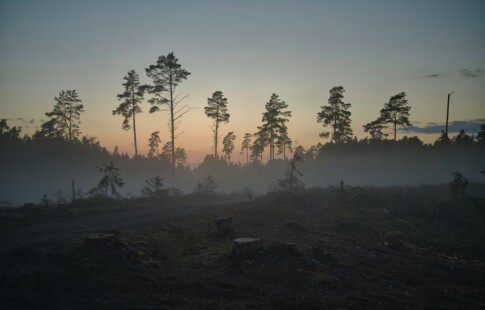
What Groups Set Hunting Regulations in Most States?
We are reader-supported. When you buy through links on our site, we may earn affiliate commission.
Hunting regulations are critical pieces of legislation protecting wildlife and people. Many are vaguely aware of the laws governing this activity, but they may not be familiar with the authority overseeing its enforcement. What groups set hunting regulations in most states, and what are their impacts on biodiversity?
The Most Prominent Groups
There isn’t one governing body over hunting regulations. In fact, multiple perspectives are required to make them comprehensive, while leveraging a diverse amount of expertise from several industries. While some may have more influence than others, these are the most notable players in controlling hunting from a conservation, legal and ethical perspective.
State Wildlife Management Agencies
There are fish and wildlife agencies in most states, and they oversee the health and well-being of what is and isn’t hunted. They note the health of each species, when there is a presence of invasive species, and when numbers are abnormal. They also define what hunting seasons are appropriate for each animal.
Tribal Governments
A tribal government’s rules may differ from state or federal governments. Sometimes, they collaborate with other entities, but they could issue their own rules for how its community hunts based on their beliefs, culture, traditions, or internal rules.
State Legislatures
This body takes the more political side of hunting regulations. Many states bundle these concerns with gun or environmental issues, and state legislatures determine what level of political influence the hunting regulations have.
Advisory Boards
Imagine a city council but for hunting regulations, and you get advisory committees. There may be representatives from many different groups, including hunting guilds, climate nonprofits, and even stakeholders in the meat or fishing industry. These boards may elect to have diverse voices to provide unique perspectives on outlining hunting regulations.
Federal Agencies
In the U.S., The Fish and Wildlife Service is the go-to authority on a federal level. It passes laws and also accepts public comment to influence legislation. It files all rules under the Federal Register. The National Park Service also has a say, especially when many species are in these protected areas. They inform hunters where and how to carry out their hunts.
Wildlife Commissions
Wildlife commissions operate similarly to management agencies, but these are a collection of appointed people who may be experts in wildlife, forestry, conservation, and more. This is important to note, as some of these groups may run nearly identically, but their distinction is the types of people making the decisions.
What Are Other Influential Bodies?
Not every group required to set hunting regulations has all the influence. A group’s influence could be positive or negative to the expansion or retraction of hunting laws, especially as the activity’s negative impacts on the environment become more publicized. Countless faces from outside these groups sway decisions one way or another. One of the most prominent are interest groups.
Organizations like the National Rifle Association (NRA) have a vested interest in widespread, lax hunting rules to promote the sale and use of firearms. It would be inaccurate to ignore the lobbying power of it and similar enterprises on hunting regulations even though they don’t set them.
Private landowners also have a stake in how people hunt. If private landowners do not want their property encroached, they can issue rules to protect the land and wildlife.
Finally, the last group responsible for changing hunting regulations is you. Every U.S. citizen has the power to change hunting regulations, especially if you are voting age. Keep tabs on what is happening in your district to see if these issues are being addressed.
Regulated Aspects of Hunting
Hunting regulations are passed for several reasons. Most important is safety. They protect hunters from using more dangerous equipment and methods, while requiring certain personal protective gear. The laws are also for the safety of the environment, detailing how hunters should interact with the land they work within. You know what groups set hunting regulations in most states, but what do they typically try to control?
Weapon Allowances
Even if hunting may be allowed in an area, it doesn’t mean all weapons are legal or permitted depending on the animal. For example, regulators may require licenses for specific weapons, like muzzleloaders, or specify how many pounds a crossbow must draw. Regulators may also require stamps to use specific weapons, prevent shooting in certain locations, or limit how many shells or bolts you have.
Bag and Possession Limits
At the state level, wildlife management agencies are responsible for determining bag and possession limits, which is how many animals hunters can kill and hold. This number may be different from how many the hunter can keep.
The reason these limits are in place is to control populations. There must be enough of a hunted species to repopulate and have availability for future generations.
Hunting Seasons
Experts determine the best times for people to be out. Animals should not be targeted during mating or nesting seasons, otherwise their numbers cannot replenish.
These hunting seasons are separated by each type of animal. It includes big and small game, birds and waterfowl, fish, and more. Many agencies will also include prohibited animals, such as exotic species, or encourage the hunting of specific animals like invasive species.
Fair Chase
Fair chase is a frequent law found in hunting regulations that attempts to give animals a fair chance at escaping hunters. It is employed for ethical reasons. Essentially, it stops hunters from using traps or restraints that prohibit the animal from escaping. It also limits the use of vehicles so animals have a chance to outrun their pursuant.
License and Education Requirements
Hunting certain animals or using some weapons will require permits, licenses, or educational prerequisites to use. This is to keep citizens safe and ensure the most ethical hunts possible.
What Groups Set Hunting Regulations in Most States? It’s a Few
There is not a single entity responsible for all the rules. However, what groups set hunting regulations in most states are wildlife management agencies and state and federal governments. Many hands have an influence including you.
Hunters, voters, and more are the voices behind legislative motivations. The effectiveness of these laws is within the citizens participating in these agencies, and they have a responsibility to protect people and the planet as much as possible.
Share on
Like what you read? Join other Environment.co readers!
Get the latest updates on our planet by subscribing to the Environment.co newsletter!
About the author

Steve Russell
Steve is the Managing Editor of Environment.co and regularly contributes articles related to wildlife, biodiversity, and recycling. His passions include wildlife photography and bird watching.





